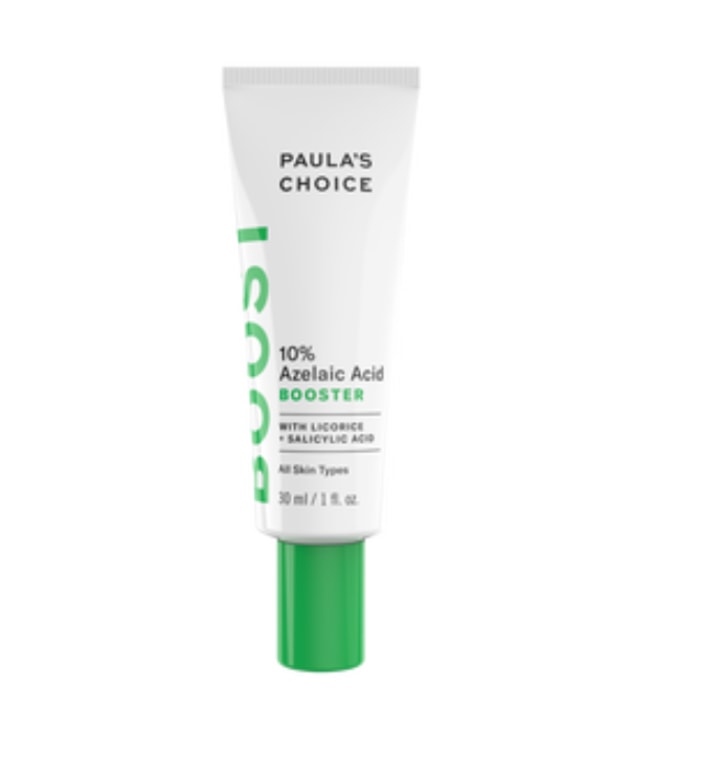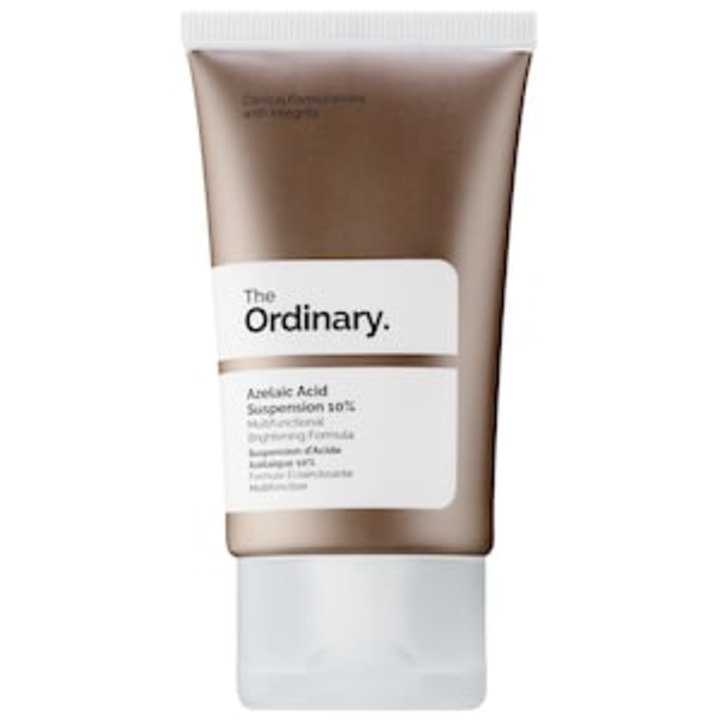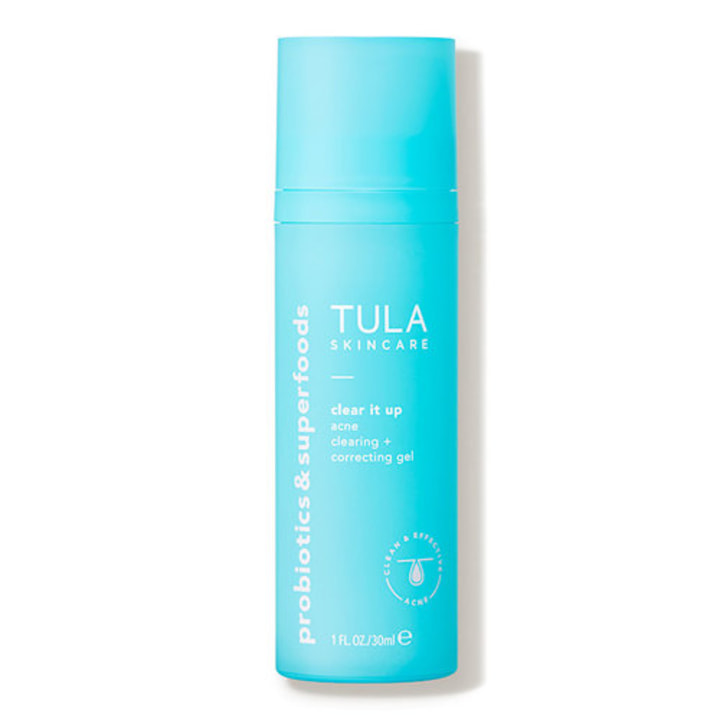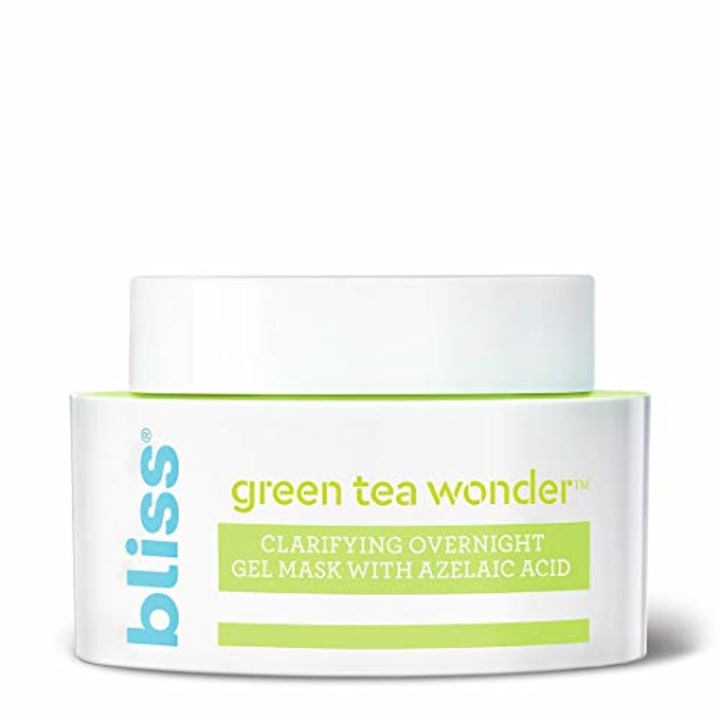Can I Use Azelaic Acid With Vitamin C
What does azelaic acid do to your skin?
Downie says that azelaic acid is also a tyrosinase inhibitor, meaning it can prevent hyperpigmentation because it interferes with melanin production. "It's anti-inflammatory for the acne and it's anti-pigment because it blocks tyrosinase. If you have a pimple and you're prone to getting dark spots after your pimple, azelaic acid would be a perfect opportunity for you," she says. Downie "strongly recommends" azelaic acid for hair bumps, pimples and overall evening of skin tone if you have dark patches on your skin. Caren Campbell, MD, a board-certified dermatologist in San Francisco, adds that azelaic acid is an antibacterial antioxidant that decongests clogged pores.
Paul Jarrod Frank, MD, cosmetic dermatologist and founder of the PFRANKMD, says azelaic acid is a more gentle exfoliant than other alpha hydroxy acids (AHAs), including glycolic, lactic and mandelic acids. Frank doesn't recommend layering azelaic acid with Beta Hydroxy Acids (BHAs) like salicylic acid as both BHAs and AHAs will increase the chances of dryness and irritation. Zeichner adds: "Unlike other acids, azelaic acid does not make you sensitive to the sun." However, he cautions against becoming lackadaisical about wearing sunscreen. "If you are using azelaic acid, you definitely should be religious about applying sunscreen. Even low levels of UV light can promote pigmentation and undo what you have accomplished with your azelaic acid," explains Zeichner.
Who should use azelaic acid — and who should not?
The medical experts we spoke with say azelaic acid is generally well-tolerated and those with sensitive skin may experience mild irritation and redness.
Who could benefit from azelaic acid
Downie says azelaic acid is "great" for those with combination or oily skin, who are "not so sensitive." She explains that azelaic acid is in class B, meaning it's safe to use during pregnancy or while breastfeeding, but it's still not in class A, aka OTC. She advises women who are pregnant or breastfeeding check with their OBGYN before incorporating azelaic acid into their skin care routine. "I tell people I'm okay with you being on azelaic acid through your pregnancy for acne or your cosmeceutical skin care, as long as your OBGYN is. If they're not, I'm not. And if they are, I am," she says. Downie adds that she "used it (azelaic acid) all through" her pregnancy 17 years ago.
Maiman agrees, and calls azelaic acid "one of few topicals that is safe for use in both pregnancy and breastfeeding, and is always an ingredient I recommend to women who have childbearing in mind." She adds it's "very difficult" for pregnant and breastfeeding women to treat acne and melasma because "a vast majority of treatments dermatologists typically use — both topical and oral — are considered unsafe or lack data necessary to conclude there is no risk to a developing fetus and or infant."
Who should stay away from azelaic acid
Downie says some of her sensitive-skin patients have also experienced stinging, burning and hyperpigmentation, "which is not typical, but it can happen." She notes that hyperpigmentation typically occurs when applying azelaic acid to thinner skin areas near the lips or eyes. Downie suggests that if "you are super sensitive and everything stings, burns and irritates your skin," do a patch test before committing to azelaic acid. Start on the back of your arm and, if there's no reaction, apply it to your neck and your face last.
How to use azelaic acid?
Azelaic acid may be used alone or paired with other soothing and brightening ingredients like niacinamide, hydroxy acids or antioxidants, says Zeichner. "It generally can be combined with other products because azelaic acid is a stable molecule," he says. Frank, who is also author of "The Pro-Aging Playbook," likes to pair azelaic acid with hyaluronic acid to provide moisture. Campbell prefers pairing azelaic acid with a moisturizer and a gentle cleanser or sulfur wash if you have acne or rosacea.
Downie recommends applying azelaic acid at night, as the final step in your skin care routine to prevent it from smearing. She advises using it as a spot treatment for inflamed or dark areas of the skin, blending the acid out, so it doesn't leave a sharp demarcation. Wait at least 15 minutes before lying down in bed and sleeping on your back for absorption purposes. "If you smear the azelaic acid and you're very sensitive to it, what that means is that you could wind up with a dark spot and a light circle around it. It will look like your dark spot is doing a hula hoop — it's gonna look crazy," she says.
Dermatologists we consulted say that prescription-strength versions are better than OTC products because they have higher concentrations of azelaic acid. However, if you're still interested in testing out an OTC azelaic acid, consider a few of their suggestions along with one of our picks.
Best azelaic acid products
1. Sesderma Azelac Ru Facial Serum
Maiman calls this serum one of her "favorites for excessive pigmentation," and notes it's usefulness goes beyond tackling melasma and post-inflammatory hyperpigmentation. It's a combination of "several potent active ingredients" — azelaic acid, retinol and vitamin C. There's also tranexamic acid, a topical treatment, "which interferes with the interaction of pigment-producing cells and works particularly well for discoloration resulting from UV light." Maiman says morus alba extract found in the serum has oxyreservatrol, an antioxidant similar to azelaic acid because it's also a tyrosinase inhibitor, which prevents hyperpigmentation. "The additional ingredients in this product act synergistically alongside azelaic acid to produce more significant results than can be produced by azelaic acid alone," she says.

2. Paula's Choice Azelaic Acid Booster
Zeichner recommends this face serum because it "delivers 10-percent azelaic acid to brighten dark spots and even skin tone." Once or twice a day, apply the non-comedogenic and hypoallergenic serum to your face to help improve hyperpigmentation caused by breakouts. While it's targeted towards all skin types, those with oily and acne-prone skin may find this booster works best because it contains salicylic acid, which keeps breakouts at bay and helps decongest clogged pores.

3. The Ordinary Azelaic Acid serum
Zeichner also suggests The Ordinary Azelaic Acid serum because it "can help improve the blemishes as well as dark spots." Hadley King, MD, board-certified dermatologist, is also a fan of this cruelty-free and vegan serum. "This formulation offers antioxidant protection, can help lighten hyperpigmentation and can help improve skin texture," she says. It's also gentle enough to use up to twice a day and contains 10 percent of azelaic acid to help brighten your complexion.

4. Tula Clear It Up Acne Clearing and Tone Correcting Gel
King recommends Tula Clear It Up Gelsince azelaic acid is the star ingredient to help brighten while niacinamide improves the tone and texture of skin. It contains two-percent salicylic acid, which she says has comedolytic effects, meaning it prevents the formation of comedones, or flesh-colored bumps on your skin. There's also probiotics, which soothe and calm inflammation, and hyaluronic acid for hydration. Cruelty-free and vegan-friendly, the company says it's gentle enough for dry and mature skin along with acne-prone, combination and oily skin types.

5. Paula's Choice Niacinamide + Azelaic Acid Duo
Maiman says she "frequently recommends" this 2-in-1 product to her acne-prone patients who are trying to conceive, are pregnant or breastfeeding. According to Maiman, the combination of azelaic acid, niacinamide and salicylic acid are "generally considered safe for both pregnant and lactating women, and work in concert to produce a highly anti-inflammatory combination that is quite effective." Together, these three ingredients target acne, minimize pores, improve dullness, alleviate redness and lessen the appearance of uneven skin tone and texture.

6. Bliss Green Tea Wonder Clarifying Overnight Gel Mask with Azelaic Acid
Two to three times a week, apply this gentle overnight gel mask to your face to help minimize the appearance of pores and slough off dead skin cells. Green tea extract soothes redness since it's an anti-inflammatory and also full of antioxidants. There's also aloe leaf juice to absorb excess oil without stripping the skin of moisture.

Catch up on Select's in-depth coverage of personal finance, tech and tools, wellness and more, and follow us on Facebook, Instagram and Twitter to stay up to date.
Can I Use Azelaic Acid With Vitamin C
Source: https://www.nbcnews.com/select/shopping/azelaic-acid-skin-ncna1236351

Posting Komentar